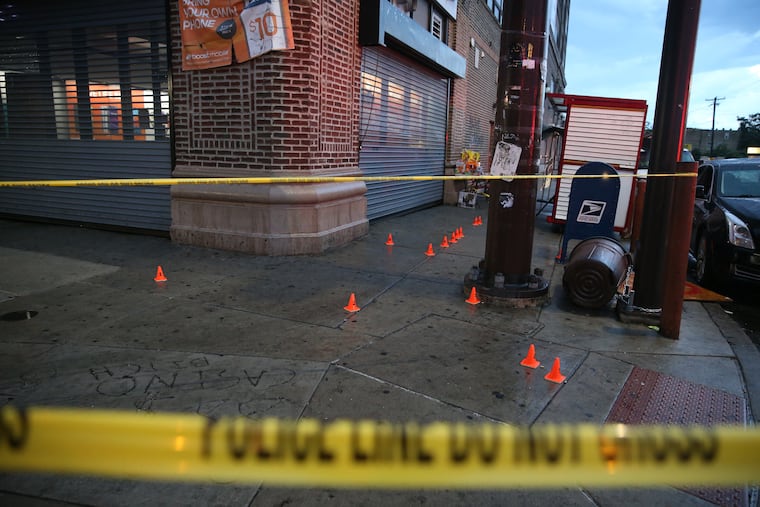Don’t get numb to gun violence, even as more people are shot in Philly each week | Opinion
Addressing the underlying drivers of violence, including systemic racism and long-standing social inequities, is crucial.

We shouldn’t have to keep writing about gun violence.
We are at risk of becoming numb to the regular reports of mass shootings around the country and the steady spate of firearm injuries and deaths here in Philadelphia.
But we must keep this conversation at the forefront of our public discourse. As of June 21, there were 225 fatal shooting victims in 2021 in Philadelphia, and an additional 786 nonfatal shooting victims. Of the total shooting victims this year alone, 92 have been children.
Overwhelmingly, Black young men bear the weight of this public health crisis, but none of us is truly spared from the trauma of gun violence. The harm does not stop with injury and deaths. Exposure to gun violence can lead to mental health challenges such as post-traumatic stress disorder, unemployment, and exposure to substance abuse. Family and community members indirectly exposed to violence are at increased risk of adverse mental health outcomes — especially among youth.
We at the Pennsylvania Safety Alliance want to stop just talking about the statistics. Addressing the underlying drivers of violence, including systemic racism and long-standing social inequities, is crucial. In addition, there are policies that we know are effective in curbing gun violence.
» READ MORE: 20 people shot — including four teens — and three stabbed this weekend in Philadelphia
One such policy would require people to get a permit before they purchase a firearm. Each person would have to go to an independent office — not the firearm dealer — and apply. They would take basic steps to ensure safety, such as taking a firearm safety course and submitting fingerprints. A permit would be approved once all appropriate checks have been completed.
Research in other states shows that these simple measures work. The processing time gives people contemplating suicide an opportunity to think and reconsider, thereby saving lives. Many people who plan or attempt suicide do not go on to die by suicide, and thoughtful approaches to supporting individuals through a time of crisis can make all the difference. Requiring a permit also gives a chance for tempers to cool before an individual can act in anger. Finally, states that have implemented laws like permit to purchase, in addition to other laws aimed at reducing illegal diversion of guns, have found that fewer crime guns were recovered by police that had indicators of having been diverted. A “straw purchaser” — someone who buys firearms and sells them to people who aren’t allowed to have them — may be more likely to think twice if required to go through the permitting process before illegally purchasing a gun for another individual.
Connecticut saw a 40% decrease in firearm homicides and a 15% decrease in firearm suicides after it passed a permit to purchase requirement. And when Missouri repealed its permit to purchase law, firearm violence climbed, with suicides increased by 16% and homicides by about 25%. Another study of large urban counties found that these laws are associated with an 11% reduction of firearm homicides.
Getting a law passed like permit to purchase requirement should not be hard. In February, we commissioned a poll of registered voters around the state. This research echoed what we see nationwide: Pennsylvanians are overwhelmingly in favor of a permit requirement. Our results showed that 73% of Pennsylvanians favor this law, while only 16% oppose it. And this support includes firearm owners: 65% of firearm owners in our sample gave the law their approval. Nationally, 90% of people support a permit to purchase a firearm, including over 80% of gun owners.
The evidence overwhelmingly supports this policy and underscores its potential to make a real difference in firearm violence. Our data suggest that Pennsylvania residents agree. But we also know that our legislature must feel pressure to act. Art Haywood, state senator from the 4th District, has in the past introduced a law requiring a license to buy a firearm, but that law hasn’t gotten any traction — despite public support. We believe there is progress in Pennsylvania on this issue, but we need more help. Let’s get to work erasing the impact of violence in our communities.
It is a myth that nothing works. We can’t let false narratives paralyze us.
Ruth Abaya is an attending physician in the Emergency Department at Children’s Hospital of Philadelphia (CHOP) and a practice-based scholar at CHOP’s Center for Violence Prevention. Dr. Abaya is also the program manager for the Injury Prevention Program at the Philadelphia Department of Public Health. Jennifer R. Clarke is the former executive director of the Public Interest Law Center and a cofounder of the Pennsylvania Safety Alliance.